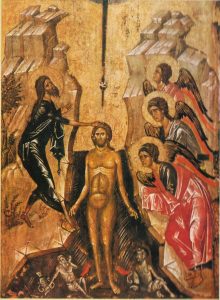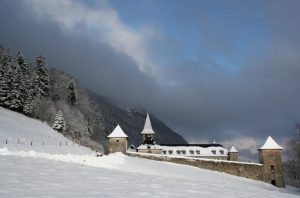Words on the Word
Baptism of Christ
You can find an English version of the text by scrolling down.
Is 40.1-11: Voici votre Dieu !
Tt 2.11-14, 3.4-7: La grâce de Dieu s’est manifestée.
Lc 3.15-22: Jésus priait, le ciel s’ouvrit, l’Esprit Saint descendit.
Il y a plusieurs manières de contempler la fête du baptême du Seigneur. Pour ce qui me regarde, j’ai peiné un peu à les découvrir. La difficulté était liée à une expérience qu’il vaudra peut-être la peine d’évoquer. Une seule fois dans ma vie j’ai fait une retraite ignacienne. C’était il y a trente ans. J’étais étudiant; je voulais apprendre à prier; je cherchais un guide. Je me suis donc inscrit pour une retraite individuelle accompagnée de dix jours à St Beuno’s au Pays de Galles, une maison chère à Hopkins qui y passait trois années heureuses et y écrivit, entre autres, son exaltant poème Le Faucon: au Christ notre Seigneur.
 Un jésuite ancien, bon et accueillant, était mon accompagnateur. Pendant notre première rencontre il m’a chargé de passer, le lendemain, trois fois une heure à méditer sur le baptême de Jésus. Ce fut un échec! Décontextualisée, la scène me parlait peu. Je me suis découvert nul en méditation imaginative. J’ai passé la journée dans une frustration croissante et ai connu, la nuit, ma première vraie insomnie. La retraite fut une grâce quand même. A la fin de mon séjour je savais que ma sensibilité était nettement plus monastique que jésuite. J’avais soif d’une liturgie nourrissante et d’une vue objective, d’ensemble sur le mystère.
Un jésuite ancien, bon et accueillant, était mon accompagnateur. Pendant notre première rencontre il m’a chargé de passer, le lendemain, trois fois une heure à méditer sur le baptême de Jésus. Ce fut un échec! Décontextualisée, la scène me parlait peu. Je me suis découvert nul en méditation imaginative. J’ai passé la journée dans une frustration croissante et ai connu, la nuit, ma première vraie insomnie. La retraite fut une grâce quand même. A la fin de mon séjour je savais que ma sensibilité était nettement plus monastique que jésuite. J’avais soif d’une liturgie nourrissante et d’une vue objective, d’ensemble sur le mystère.
C’est la liturgie qui m’a révélé le sens de l’évènement que nous célébrons. Elle nous présente le baptême du Seigneur comme un aspect de sa divine Épiphanie. Une logique interne unit l’adoration des Mages à la sortie du Christ des eaux du Jourdain. Proclus de Constantinople, un contemporain de Saint Augustin, dit magnifiquement:
La fête précédente nous montrait un pauvre nourrisson qui manifestait notre pauvreté. La fête d’aujourd’hui nous le fait voir dans sa perfection. Elle nous suggère qu’il est l’Être parfait, issu de l’Être parfait. Alors, pour les Mages, le Roi était revêtu de la pourpre de son corps. Aujourd’hui, au baptême, celui qui est la Source, est enveloppé par l’eau du fleuve.
La kénose de Dieu, justement, est révélée aux Mages. Ils voient Dieu, le Roi de l’univers, ‘revêtu de la pourpre de son corps’, un enfant de l’homme ayant adopté la nature humaine jusque dans sa misère pour ainsi la relever. Au bord du Jourdain, la foule des juifs voient l’homme comme Dieu, incarnant une échelle vivante qui réunit terre et ciel. Ces manifestations complémentaires coïncideront à Cana, où Jésus se montre à la fois humainement accessible et divinement sublime, transformateur.
Entrant dans le fleuve, le Christ marie la promesse prophétique à la réalité présente. Il sait que son passage par les eaux représente un accomplissement (Mt 3.15). Le Baptiste le sait aussi. Il est le pont entre deux testaments, deux mondes (sur une rive le plus grand, sur l’autre le plus petit), le garant de l’axe horizontal et historique de l’événement. Le Christ ne prononce aucune parole, ne fait aucun geste. L’action qu’il accomplit n’est pas en soi extraordinaire. Il suit une foule anonyme. Mais pendant que les autres gens noient par intention dans l’eau des charges spécifiques de culpabilité, Jésus porte dans son corps ‘le péché du monde’ (Jn 1.29).
Saint Paul, dans ses lettres, nous rappelle que notre rédemption est effectuée en Christ. Elle devient effective ici, au seuil de l’Israël de Dieu, quand Jésus, dont le nom veut dire ‘Dieu sauve’, entre librement dans sa mission. L’immersion dans l’eau se fait discrètement, pourtant le silence est rompu quand la voix du Père éclate en approbation. Cette voix hors temps établit l’axe vertical de louange — une louange paradoxale qui résonne du ciel à la terre, nous rappelant que l’offrande du Fils s’oriente, non pas vers une froide Transcendance sans visage, mais vers un Père qui l’accueille reconnaissant et scelle l’échange en envoyant l’Esprit sous la forme qui jadis s’envola de la main de Noé, incapable de trouver du repos pour ses pieds, mais qui vient maintenant demeurer (Jn 1.33) sur les prémices d’une nouvelle création.
Proclus de Constantinople, évoquant la Source de toutes choses enveloppée par le fleuve, dit:
Le Feu se plonge dans l’eau.
L’eau est un élément polyvalent pour l’homme. Nous en avons besoin pour vivre: les sécheresses dramatiques de nos jours présagent que de futurs conflits mondiaux se joueront sur l’accès à l’eau. Au même temps l’eau nous menace. L’hypothèse d’un monde noyé par la montée des mers inspire un grand nombre de livres et de films apocalyptiques.
Dans le baptême du Christ, Dieu, qui au Deuxième Jour de la création mit une limite aux eaux, touche cet élément montré dans l’iconographie comme un être vivant. Isaïe prophétisa: ‘Quand tu traverseras les eaux, je serai avec toi, les fleuves ne te submergeront pas’ (43.2). La traversée par laquelle le Christ nous porte nous ouvre la vie en plénitude; au même temps elle sanctifie la mort. Nous ne devons donc craindre ni l’une ni l’autre. Dieu est présent et règne même dans l’apparent anéantissement. ‘Je prends les ailes de l’aurore et me pose au-delà des mers: même là, ta main me conduit, ta main droite me saisit’ (Ps 138.9-10).
Voilà la bonne nouvelle que cette fête proclame. Maintenons la perspective large, infinie qui s’ouvre par le baptême du Christ. Suivons-le, notre Sauveur, allègrement, dans la paix, abandonnant toute pusillanimité, nous sachant bien-aimés dans le Bien-Aimé. Amen.
***
J’ai surpris ce matin le chouchou du matin, le digne
Dauphin des états du jour, le Faucon tiré par l’aube, en selle,
Déroulant un tapis d’air stable sous la ligne
Qu’il traçait là-haut — spirale, par la longe d’une aile
Extasiée! Toujours plus loin, plus fort, comme signe
En arc un talon de patin qui vire — élans et rappels
Bravaient le grand vent. Mon cœur qui cligne
A fondu pour ce vol maître du ciel.
Beauté brute et valeur et acte, oh air et gloire ralliés,
Tu plonges! Alors le feu qui sort de toi est des millions
De fois plus fascinant, plus redoutable, ô mon chevalier!
Quoi d’étrange? Un seul pas et le soc dans le sillon
Brille! Et les braises bleu-blême, ah mon allié,
Tombent, s’écartèlent et saignent or-vermillon.
Traduction par Jean-Pierre Issenhuth.

Isaiah 40.1-11: Behold your God!
Titus 2.11-14, 3.4-7: God’s grace has been revealed.
Luke 3.15-22: While Jesus was at prayer, heaven opened.
There are various ways in which to approach today’s feast. I struggled to discover them. The difficulty is linked to an experience it may be worthwhile relating. Once in my life I have done an Ignatian retreat. It was thirty years ago. I was a student; I wished to learn to pray; I sought a guide. So I signed up for a ten-day directed retreat at St Beuno’s in North Wales, a house dear to Hopkins, who spent happy years there during which he wrote, among other things, his splendid Windhover poem ‘to Christ our Lord’. A seasoned Jesuit, gracious and kind, was my director. When we met on my arrival he told me to spend, the following day, thrice one hour meditating on the Baptism of Christ. It was a disaster! Out of context, the scene did not speak to me at all. I discovered I was useless at imaginative meditation, inept at composition of place. I spent the day in increasing frustration and experienced, the following night, my first real insomnia. The retreat was a blessing all the same. At the end of my stay I knew my sensibility was clearly more monastic than Ignatian. I was hungry for nurturing liturgy and for an objective, overall view of the mystery.
It was the liturgy that, in time, revealed the sense of what we now commemorate. It presents the Baptism as an aspect of the Lord’s Epiphany. An internal logic ties the adoration of the Magi to Christ’s emergence from the Jordan. Proclus of Constantinople, a contemporary of Augustine, has written magnificently:
In the previous feast we saw a weak baby, giving proof of our weakness. In today’s feast, we see a perfect man, hinting at the perfect Son who proceeds from the all-perfect Father. At Christmas the King puts on the royal robe of his body; at Epiphany the very source enfolds and, as it were, clothes the river.
God’s self-emptying is revealed to the Wise Men who see God, King of the Universe, wearing ‘the royal robe of his body’. They see God as a son of man having adopted human nature even in its misery in order, thereby, to raise it up. On the bank of the Jordan, the assembled crowds see this man as God, embodying a living ladder uniting heaven and earth. These manifestations of manhood and godhead later coincide at Cana, where Jesus shows himself simultaneously humanly accessible and divinely sublime, performing a great work of transformation.
Descending into the River, Christ marries a world of promise to one of lived reality. Transposing the future tense of prophecy into the present, he is conscious of his passage through the waters as ‘fulfilment’ (Mt 3.15). So is the Baptist, himself a bridge (on one bank the greatest, on the other, the least), guarantor of the horizontal, historical axis of the event. Christ utters no word, makes no gesture. The action he performs is not in itself extraordinary. He follows a throng of anonymous others. But while they drown individual loads of guilt in the Jordan by intention, he carries the totality of sin in his body and for real (John 1.29).
The categorical ‘in him’ that underpins Paul’s Christology with locative force becomes effective here, on the threshold of God’s Israel, as Christ enters fully, freely into his mission. The crossing happens secretly, but silence is broken when the Father’s voice erupts in jubilant approbation. It establishes a vertical axis of praise — praise that, in this instance, resounds from heaven to earth. It reminds us that Christ’s offering is directed, not towards a faceless Transcendence but to a loving Father who receives it thankfully and seals the exchange by sending the Spirit in the form that once flew forth from Noah’s hand, hovering on the waters, unable to find rest for its feet in a drowned, stricken world, yet now coming to ‘abide’ (Jn 1:33) on the first fruit of a new creation.
Proclus, after speaking of the Source clothing himself in the river, exclaims:
‘Fire immersed in water!’
Water is polyvalent for man. On the one hand we need it to live: the dramatic droughts plaguing today’s world presage that future global conflicts will be played out on the basis of access to water. At the same time, water threatens us. The spectre of a world drowned by rising seas informs any number of apocalyptic books and films right now. In the Baptism of Christ, God, who on the second day of creation set water a limit, touches this element, which iconography shows as a living being.
Isaiah once prophesied: ‘When you pass through the waters I shall be with you, the floods will not drown you’ (43.2). The passage through which Christ carries us opens for us fullness of life; at the same time it sanctifies death. We shouldn’t, then, fear either. God is present, present as King, in what may appear as annihilation. ‘If I take the wings of the morning and dwell in the uttermost parts of the sea, even there your hand shall lead me’ (Psalm 138.9-10). This is the Good News proclaimed by today’s feast. Let us keep our perspective broad, open to the infinite vastness unsealed for us through the Baptism of Christ. And let us follow him, our Saviour, gladly, in peace, abandoning small-mindedness and pusillanimity, knowing we are profoundly loved in the Beloved. Amen
***
